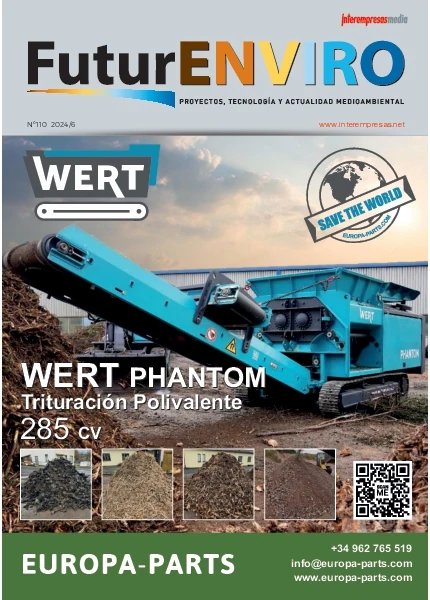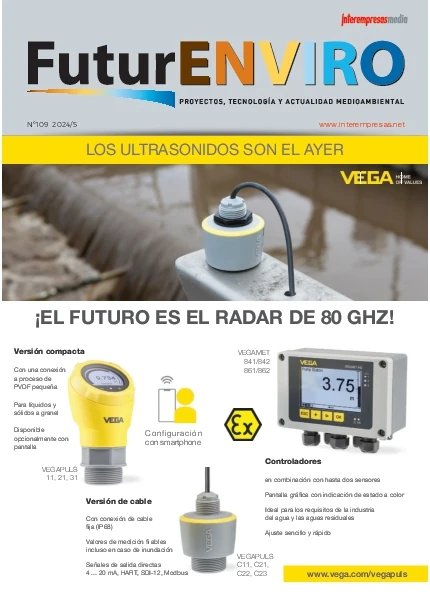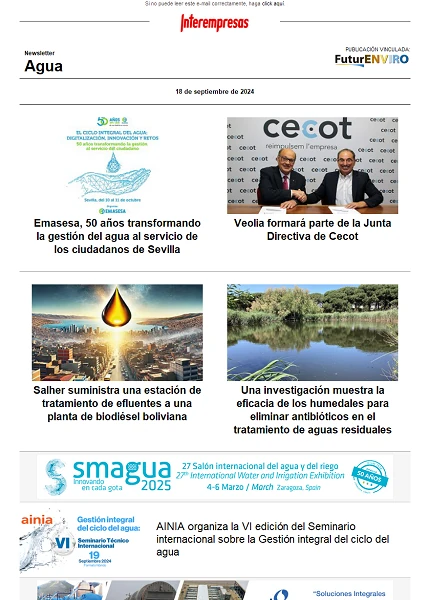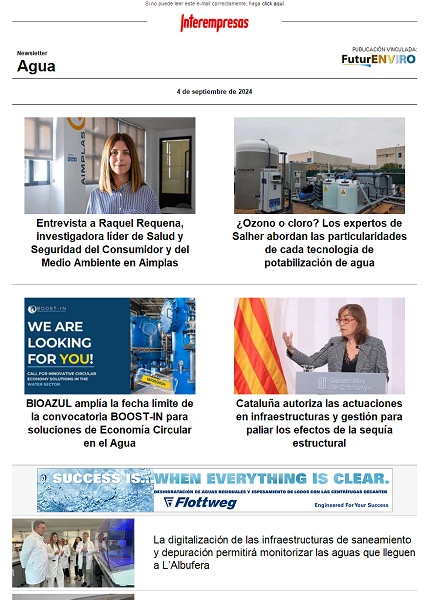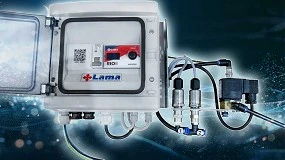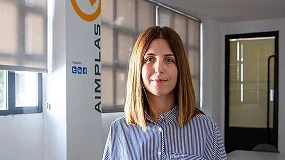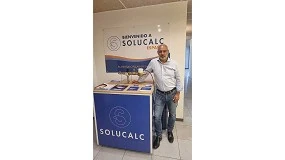Las empresas de servicios de abastecimiento, saneamiento y reutilización de agua demandan una subida del canon
El sector alerta del déficit tarifario
Un estudio llevado a cabo por la Asociación Española de Abastecimientos de Agua y Saneamiento (Aeas) y la Asociación Española de Empresas Gestoras de los Servicios de Agua a Poblaciones (AGA) demuestra que las tarifas que paga el usuario no cubren la totalidad de los costes de los servicios de agua urbana. Para Fernando Morcillo, director general de Aeas, estos servicios en nuestro país gozan de “un excelente nivel de calidad, seguridad y confort”, pero no son sostenibles a medio o largo plazo en la situación actual y con el nivel tarifario existente. Por ello, propone subir la tarifa a particulares, empresas e industrias. “El esfuerzo debe ser colectivo y no sólo del sector de usuarios urbanos, pero ordenado y paulatino”, explica.
El grado de cobertura de los costes por las tarifas en nuestro país es “bastante heterogéneo”, dado que la responsabilidad de la fijación de las tarifas es municipal y, por tanto, corresponde, en general, a cada ayuntamiento el establecimiento de la estructura tarifaria y los precios imputables al usuario por el desarrollo del servicio.
Según explica a Interempresas Fernando Morcillo, director general de Asociación Española de Abastecimientos de Agua y Saneamiento (Aeas), la Directiva europea Marco del Agua estableció en el año 2000 las políticas de ‘recuperación de costes’, a través de la ‘contribución adecuada de los usuarios’, bajo el principio de ‘quién contamina paga’. “Y todo ello considerando que hay costes operativos, financieros y de mantenimiento, pero también costes ambientales y del ‘recurso’, el agua natural”, añade Morcillo.
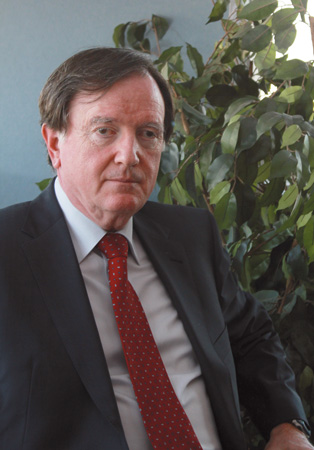
Parece obvio pensar que en España, al tratarse un país seco y con una fuerte fluctuación estacional y geográfica, el coste del recurso debería ser superior al de los países de la Europa húmeda.
Evidentemente, la sociedad española se hace cargo de todos los costes de los servicios de agua, ya que, en caso contrario, estos o las infraestructuras que los hacen posibles estarían deteriorados, no serían de calidad o simplemente no existirían. Pero, según recuerda el director general de Aeas, tradicionalmente esto se hace a través de lo que los europeos resumen en el concepto ‘3T’, es decir, mediante las tarifas, los impuestos generales (la segunda T correspondiente a tax o impuesto en inglés) y las transferencias (subvenciones europeas básicamente).
‘El que contamina paga’
Las tarifas progresivas de bloques de consumo de precios crecientes para los usuarios domésticos y el gravamen mediante los índices o coeficientes de contaminación aplicables a los vertidos industriales son mecanismos de utilización práctica que aseguran el cumplimiento del principio de ‘el que contamina paga’. No obstante, señala Morcillo, nuestro país “debe progresar en la labor divulgativa y pedagógica ante el ciudadano para resolver, por la vía preventiva, problemas reales como las malas prácticas de uso higiénico de los desagües e inodoros domésticos: negativas prácticas de empleo del inodoro como ‘cubo de basura’ o la mala costumbre de verter productos químicos domésticos o medicinas sobrantes o caducadas, aceites minerales y vegetales, y otros impropios”.
Para Morcillo, las administraciones públicas españolas dedican en la actualidad muy poco presupuesto: “No hay más que ver las importantes reducciones del presupuesto general del Estado y de los autonómicos y locales, dada la importante deuda pública que se arrastra”. Además, asegura, las transferencias europeas a España en esta materia parece que se han acabado en el nuevo ciclo presupuestario. Por tanto, “sólo la adecuación de las tarifas, en concordancia con la política europea, permitirá mantener el excelente nivel de calidad, seguridad y confort de los servicios de agua urbana”.
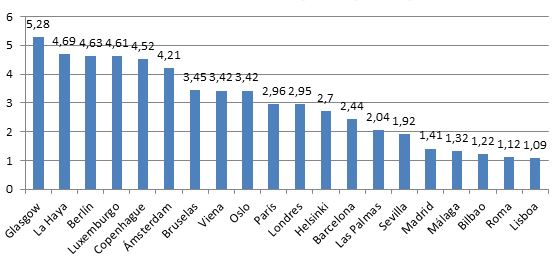
Precio del agua en algunas ciudades europeas (€/m3). Fuente: Aeas-AGA.
Según demuestra esta tabla, España se sitúa en la parte baja del ranking de los precios asumidos por el usuario vía tarifas. El director general de Aeas pone como ejemplo un estudio reciente de la Fundación Aqualogy, publicado dentro de la colección Aquae Papers por el Colegio de Economistas de Madrid, con el título ‘Estudio sobre el precio del agua en España’. “El estudio indica que el esfuerzo del ciudadano español en materia de servicios de agua se queda en dos tercios del correspondiente a la media europea, mientras que pagamos más que la media europea (homogenizando el nivel de vida y la renta per cápita); un 25% en teléfono o el 23% en la compra de energía”, apunta.
La solución
Para Morcillo la solución pasa por subir la tarifa a particulares, empresas e industrias. “Sin duda, en la coyuntura actual, parece necesario realizar los análisis económicos encaminados a tomar decisiones en materia de evolución futura de las tarifas, puesto que todo parece indicar que es preciso incrementar el precio del agua”. Y no sólo del agua urbana, que representa algo menos del 20% del consumo total, ya que el resto es agricultura e industria no urbana. “El esfuerzo debe ser colectivo y no sólo del sector de usuarios urbanos, pero ordenado y paulatino”, añade.
El gasto familiar de los servicios de agua urbana (abastecimiento y saneamiento o depuración de residuales) es del 0,7% del total, es decir, de cada 100 euros que gastamos en nuestros hogares tan sólo pagamos 70 céntimos de euro, mucho menos de un euro, por los servicios de agua, siendo como es un bien básico y vital.
“Con lo que gastamos en una caña de cerveza tenemos para 2,6 días de consumo de una familia de 3 miembros. Una ducha en verano nos cuesta 11 céntimos. Sin duda datos significativos que nos deben hacer pensar”, explica el director general de Aeas. Hace ahora 4 años Aeas organizó una jornada temática de expertos titulada ‘¿Pagamos lo que cuesta el agua?’. “Esta misma reflexión la debemos hacer los ciudadanos”, sostiene.
“Tenemos unos servicios excelentes, lo cual es más extraordinario en un país seco, y esto es un mérito de nuestra sociedad, de las sucesivas generaciones que nos han precedido y también de la nuestra. Esta tradicional cultura, con sus lógicos altibajos, y la absolutamente imprescindible continuidad de las políticas (que deberían ser de Estado, pactadas y alejadas de las discusiones partidistas y cortoplacistas) son claves que deberían de permanecer y que tendríamos que potenciar para dejar el mejor legado a las generaciones venideras”, opina Morcillo.
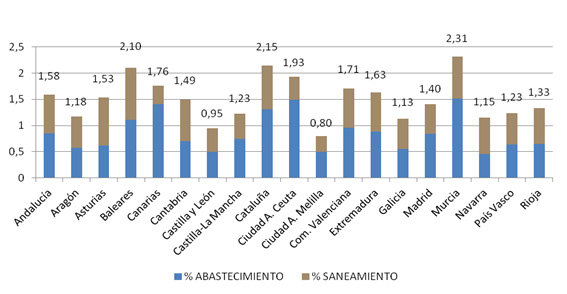
Precio del agua de uso doméstico por comunidades autónomas (€/m3). Fuente: Aeas-AGA.
El caso de Murcia
Las condiciones de disponibilidad natural del recurso y de su calidad ambiental original repercuten en el coste (mayores necesidades de almacenamiento, transporte y de tratamiento). Sin embargo, lo que más influye en el precio asumido por el usuario es el grado de cobertura de los costes por la tarifa. Esto explica por qué el precio del agua en Murcia es el más elevado de nuestro país.
Sin duda, Murcia es una región seca, y sus fuentes de aguas naturales no son las de mejor calidad, comparadas con otras regiones. Además, explica Morcillo, el modelo murciano de gestión de aguas residuales (“de ámbito autonómico, magníficamente gestionado por la entidad pública Esamur y con un canon de depuración bien estructurado y aplicado”) es prácticamente “autosuficiente” y, por tanto, los costes se cubren con esta tarifa que pagan todos los usuarios del servicio concreto de depuración.
Nuestro consumo doméstico
En España el ratio de consumo doméstico es de los más bajos del mundo avanzado, compatibilizado con un excelente nivel de confort doméstico y calidad (126 litros por habitante y día en uso doméstico). En este sentido, Morcillo añade: “El esfuerzo de nuestra Administración Pública y de los operadores sostenido y reiterado —esfuerzo antinatural en una actividad económica, pues los operadores de agua somos de las pocas empresas que hacemos publicidad para que se consuma menos producto— ha ayudado mucho a esta sensibilización, al igual que el empleo de tarifas progresivas, ampliamente generalizadas en España, que gravan el despilfarro”.
A la vanguardia en tecnología
Tanto en ingeniería como en construcción o en prestación de servicios de abastecimiento, saneamiento y reutilización, el sector español es puntero en el ámbito internacional. Así lo acredita, explica Morcillo, la presencia empresarial española en el exterior. “Son bien conocidas nuestras empresas especializadas en diseñar proyectos, implantar infraestructuras de desalación de aguas de mar y operarlas y mantenerlas durante su vida útil, por ejemplo”, afirma.
“Quizás es menos visible, pero son casi 100 millones de personas, más allá de nuestras fronteras, a la que nuestros asociados (empresas públicas y privadas y operadores de servicios de agua) prestan diferentes tipos de servicios en el ciclo del agua urbana. Es, sin duda, un sector representativo del buen hacer que debería ser sinónimo de la ‘Marca España’, en nuestro caso con el apellido ‘Agua”, añade.
Desde hace años, la asociación demanda el mayor apoyo posible de la Administración Pública y de aquellas instituciones responsables de la imagen y exportación internacional, pues es “imprescindible” para poder competir en este mundo global. Y los hechos ayudan, argumenta Morcillo, ya que el modelo español de gobernanza y administración del agua (Demarcaciones Hidrográficas) es reconocido mundialmente y goza de un enorme prestigio y tradición. “No en vano una de las primeras leyes en materia de aguas fue la española de 1879”, explica.
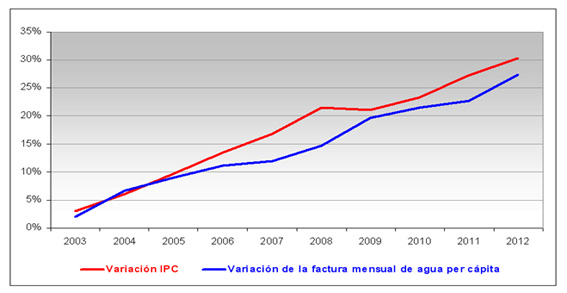
Según demuestra la gráfica, el incremento de la factura real de agua para un usuario tipo, en los últimos 10 años, está por debajo del IPC. Fuente: Aeas-AGA.
Leyes y normativas
El aparato legal europeo y español es “muy amplio y complejo”. Hasta tal punto los es así, explica Morcillo, que en la actualidad la Comisión Europea ha redactado una especie de libro blanco, o Blue Print, como se denomina en la jerga europea, para intentar disponer de una visión sectorial esquemática y simplificada. Nuestra estructura estatal competencial, con responsabilidades autonómicas y locales, es “muy compleja y en algún punto algo discordante”.
Según el director general de Aeas, el sector necesita una cierta armonización, ya que dispone de más de 2.000 operadores de servicios diferentes regulados fundamentalmente por los ayuntamientos y esto genera “heterogeneidades que no entiende el ciudadano y que hacen menos eficiente el trabajo de los operadores”. Por ello, la asociación aboga por una regulación básica general que, según otras experiencias nacionales e internacionales, podría ayudar a la necesaria eficiencia. “Las ideas avanzadas por el ministro Arias Cañete sobre el análisis y optimización del marco legislativo al respecto (modificación o complementación de la Ley de Aguas) son un referente digno de resaltar y que nos anima”, apunta en este sentido Morcillo.
A esta eficiencia, señala, le ayuda la agrupación o concentración de servicios aislados para crear áreas poblacionales de mayor entidad. “Entendemos que es un avance la promulgación de la reciente Ley 27/2013, de 27 de diciembre, de racionalización y sostenibilidad de la Administración Local, que promueve la coordinación de servicios municipales con población menor de 20.000 habitantes por las diputaciones y el establecimiento del coste efectivo”.
Por otro lado, Morcillo afirma que los modelos de integración del conjunto de actividades de los servicios urbanos (abastecimiento, saneamiento y reutilización) son “un ejemplo exitoso” para avanzar en dicha eficiencia. “Así, si avanzáramos en una regulación armonizadora, en el fomento de unidades eficientes y en la integración de servicios, progresaríamos en el objetivo de servir mejor al ciudadano”.
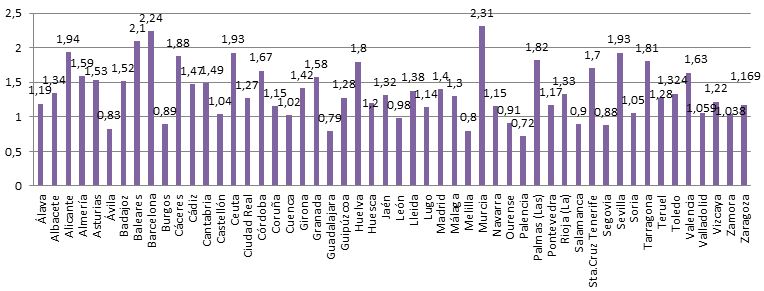
Los puntos débiles del servicio
Para Morcillo, el abastecimiento de agua, es decir, el suministro, es “razonablemente bueno”, y así lo confirman las sistemáticas encuestas que llevan a cabo los operadores entre los usuarios. Sin embargo, los servicios de agua integran más actividades. Así, el apartado de alcantarillado sufre de “bastantes deficiencias” por antigüedad y obsolescencia de las redes colectoras, pero también por falta de tecnificación en la conservación y mantenimiento preventivo y avanzado.
En la depuración de residuales, el propio Magrama reconoce el incumplimiento parcial del programa de depuración y los expedientes sancionadores abiertos por la Comisión Europea. Además, según apunta el director general de Aeas, es necesario construir algunas depuradoras para dar servicio a poblaciones medianas o pequeñas y adaptarnos al cumplimiento de mayores exigencias en la calidad de los vertidos a las denominadas zonas sensibles (depuración adicional de nutrientes: fósforo y nitrógeno). “Pero quizás el problema más grave, sea el derivado de las necesidades económicas para mantener y mejorar los sistemas, por lo que volvemos de nuevo al precio”, añade.
Para Morcillo, en saneamiento “falta mucho más por hacer”. En el año 2007, el monto presupuestario del denominado Plan Nacional de Calidad de las Aguas ascendía a 19.000 millones de euros, de los que, según el director general de Aeas, se han ejecutado muy pocos. “Tenemos un déficit de infraestructura por hacer, al que hay que sumar el coste de la conservación y renovación del completo y complejo patrimonio hidráulico dedicado al ciclo integral del agua. Y si no hay muchas posibilidades de atender estas necesidades con los presupuestos públicos, pocas salidas se tienen salvo que el ciudadano los asuma, vía tarifa. Y como se requiere financiación, y que no compute como deuda pública, las opciones pasan por las Colaboraciones Público Privadas (CPP)”.
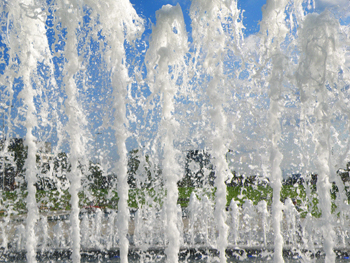
Un servicio eficiente y sostenible
Para Morcillo, en materia de agua, España es “eficiente, tecnológicamente avanzada y competitiva”. Sin embargo, “debemos mejorar los mecanismos financieros para hacer frente a los compromisos europeos, a los exigidos por la sostenibilidad medioambiental y el mantenimiento de los niveles de calidad a los que estamos acostumbrados”, apunta.
Las infraestructuras y los servicios españoles de agua urbana son “poderosos y potentes” y tienen, por tanto, bastante inercia. “Si durante un año no se invierte en reposición o renovación no pasa nada. Quizás tampoco notaríamos mucho deterioro en dos años. Pero al cabo de cinco o diez años el deterioro es evidente y podría ser irreversible o requerirá esfuerzos extraordinarios para recuperar los estándares de calidad. Ahora, transcurridos algo más de 5 años de crisis y de extraordinaria reducción de las inversiones públicas, no deberíamos de seguir mucho tiempo más sin retomar los niveles anteriores. En la situación actual y con el nivel tarifario existente los servicios no son sostenibles a medio o largo plazo”, señala.
Sobre Aeas
La Asociación Española de Abastecimientos de Agua y Saneamiento (Aeas) es una asociación profesional, que agrupa y representa a entidades, empresas y personas que proporcionan servicios de abastecimiento, saneamiento y reutilización de agua. Los 300 asociados de Aeas, de carácter público, privado o mixto dan servicio a más de dos tercios de la población española y a más de 100 millones de personas fuera de nuestro país.
Constituida en 1973, Aeas coordina, divulga y defiende la actividad de los servicios y empresas de abastecimiento de agua y saneamiento y es un motor de estímulo a la investigación, colaboración y comunicación en el sector. Además, colabora con las administraciones en materia de legislación, reglamentación y actuación técnica, buscando siempre la mejora de los servicios de agua y manteniendo un papel activo en formación y estudios sobre la actividad, siempre en colaboración con todos los agentes públicos y privados.


